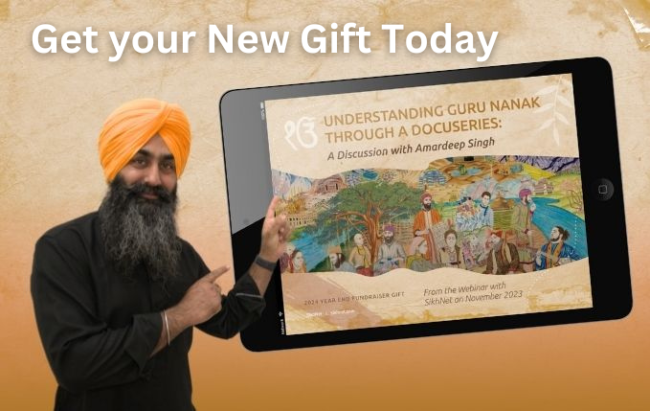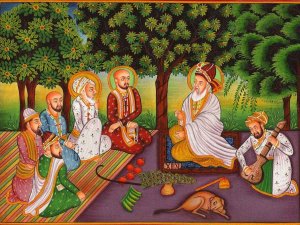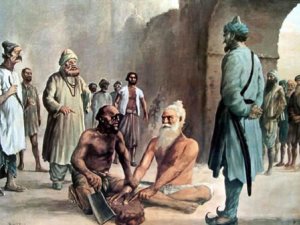'Anand' respectfully called Anand Saahib is a composition uttered by Guru Amar Das, the third Master, in the measure Ramkali. It is incorporated in Sri Guru Granth Sahib at pages 917 to 922. It is one of the five compositions (Baanees) recited by the Panch Piaaaray (the five beloved ones) while preparing Amrit for initiation of devotees (baptizing) into the Khalsa Brotherhood. This holy hymn is a part of daily morning prayers of a Sikh. This holy hymn contains forty stanzas, but in a short form of six stanzas, first five and the last one, it is recited before the prayer (ArDas) at the end of every Sikh congregation. This short hymn of 6 stanzas is also recited on occasions of marriages and rejoicing, before large feasts and at the preparation of sacred food. This sacred hymn is recited even before prayer done at the death of a Sikh. Anand Saahib composed by Guru Amar Das is considered as blissful as Guru Nanak's Jap ji and Guru Arjan Dev's Sukhmani.
Its Background
Macauliffe, In his book 'The Sikh Religion,Vol.1 page 116 (1978) writes :- One day a Sidh Jogi went to see the Guru and humbly addressed him,' Since thou ,O Guru, hast been enthroned, I have desired to behold thee. I am fortunate today in having attained my object. I have performed every form of penance, but finding it all unavailing, have now come to thee. I wish to obtain mental rest and assurance that when I abandon this body I shall be born in thy family and so be happy worshipping God and singing His praises.' The Guru replied' Perfection and happiness are not obtained by calling one's self a Sidh and obtaining many followers. It is by devotion to God that real happiness is obtained. And as thou desired to be born in my family, thou shall be Mohri's son, my grandson' The Jogi, in order to pursue his devotion without interruption, retired to the margin of the Bias, and there parted with his body. On seeing his newly born grandson, Mohri's second son, the Guru composed the Anand or Song of Joy on the spot and taking the infant in his lap gave him the name of Anand.' Bhai Santokh Singh, author of 'Gur Partap Suraj Granth, writes in Raas 1st of the Granth that Guru Amar Das composed this in his old age at the time of the birth of his grandson whom he named Anand. He also mentions the story of meeting the Guru with the Jogi. To me this story seems to be mythology. No doubt, Anand, grandson of Guru Amar Das, was a respected personality.
Meanings of Anand
According to 'Enclopedia of Sikhism.Vol.1 (Punjabi University, Patiala) page 118, root of the word Anandi is the Sanskrit word 'nand' which means to rejoice or to delight. It denotes mystical experience, spiritual bliss or a state of consciousness such as that of 'jivan mukta' i.e. one released while still alive in body. In simple words, we can say that Anand means bliss, eternal peace and real not artificial Joy that we derive from merry making.In Sikh theology, anand is one of the attributes of the Lord. It can be the state of an individual soul. It is said that the person who recites this Bani in the morning with dedication, attention, and comprehension will achieve bliss and peace of mind throughout the day.. Anand pertains to the Bliss of the Atma ( soul); it does not diminish in adversity.
How to Obtain Anand?
Guru Amar Das gives an exposition of the experience of anand, of the union with the Lord attained through absorption in naam. He starts this sacred hymn with the affirmation that the experience of Anand comes only through meeting with the True Guru and fully imbibing his instructions:
Anµdu BieAw myrI mwey siqgurU mY pwieAw ]
siqguru q pwieAw shj syqI min vjIAw vwDweIAw ] (SGGS:917)
'I am in bliss, O my mother, for I have found my True Guru.
I have attained the True Guru with tranquility and peace, and in my mind there is jubilation and joy'.
Longing for experience of Anand is inherent in human beings and it is universal, but only a few can obtain it with the Grace of the Guru who is the sole guide and remembrance of the Name, living by Divine virtues and commands, is the only method. Grace of the Guru is the only source to obtain it:
Awnµdu Awnµdu sBu ko khY Awnµdu gurU qy jwixAw ]
jwixAw Awnµdu sdw gur qy ik®pw kry ipAwirAw ] (SGGS:917)
'Everyone talks of bliss; bliss is known only through the Guru.
Eternal bliss in known only through the Guru when the Beloved Lord grants His Grace.'
Guru Amar Dassays that stability of mind (Sahaj) cannot be realized with the formal rituals.
krmI shju n aUpjY ivxu shjY shsw n jwie ] (SGGS:919)
'By religious rituals, intuitive poise is not found; without intuitive poise, skepticism does not depart.'
Experience of Anand
Anand is not an intermediate state in the journey of a human being towards the Lord, but the unitive one. It cuts the knots of attachment and grants sublime ways of living. It is liberation from all sufferings and sorrows, sickness and pain. In the words of Col. Dr Dalvinder Singh Grewal :Anand is a state of freedom. From freedom comes supreme bliss. Hence the best means to experience anand or happiness is liberation from worldly network, liberation from attachment to wealth, women and wine; liberation from lust, anger, greed, passion, pride; liberation from coming and going into this world. Guru Amar Das has also said:
kir ikrpw iklivK kty igAwn AMjnu swirAw ]
AMdrhu ijn kw mohu qutw iqn kw sbdu scY svwirAw ]
khY nwnku eyhu Anµdu hY Awnµdu gur qy jwixAw ] (SGGS:917)
Granting His Grace, He cuts away our sins; He blesses us with the salve of spiritual wisdom.
Those who eradicate attachment from within are adorned with the Word (their speech is embellished by the True Lord ).
Says Nanak, this alone is bliss which is attained from the Guru.'
Meeting God, the true Guru, the mind is filled with bliss. Chanting His Naam, (the Name of the Lord), the mind becomes blissful. One is rejoiced in the eternal bliss received through the Word of God.Essential conditions of experiencing Anand are given in the last stanza of the hymn given below:
dUK rog sMqwp auqry suxI scI bwxI ]
sMq swjn Bey srsy pUry gur qy jwxI ]
suxqy punIq khqy pivqu siqguru rihAw BrpUry ]
ibnvMiq nwnku gur crx lwgy vwjy Anhd qUry ] (SGGS:922)
'Listening to the True Bani, I am rid of pain, illness and suffering.
The Saints and their friends are in ecstasy on knowing it from the Perfect Guru.
Pure are the listeners, and pure are the speakers, and they see the True Guru is all-pervading and permeating.
Prays Nanak, in the soul of those who touch the Guru's Feet (act upon his advice) vibrate and resound the unstruck bugles.'
Its Subject Matter
In the opening stanza, the Guru tells us that it is through the Guru that Bliss (Anand) can be attained and reveals to us that Guru is the Guru's Shabad -the Holy Word revealed by the Lord. In the next eight stanzas, the Guru enjoins on man todwell his mind on the Holy Word, cherishing which all sins are annulled, all desires are fulfilled and mind is stilled. Consequently, man attains eternal peace, joy and bliss:
ey mn myirAw qU sdw rhu hir nwly ]
hir nwil rhu qU mMn myry dUK siB ivswrxw ] (SGGS;917)
'O my mind! Remain always with the Lord and all sufferings will be forgotten.'
In the 10th and 11th stanzas, the Guru tells us that God cannot be attained by intellectual cleverness, for mammon is fascinating and alluring. It imprisons us within the walls of family and friends:
ey mn cMclw cqurweI iknY n pwieAw ]
cqurweI n pwieAw iknY qU suix mMn myirAw ]
eyh mwieAw mohxI ijin eyqu Brim BulwieAw ] (SGGS:918)
'O fickle mind, no one has found the Lord through cleverness.
Through cleverness, no one has found Him; listen, O my mind.
This mammon is so fascinating that because of itpeople wander in doubt.'
In the 12th to 21st stanzas, the Guru tells us that God is Infinite and Unknowable. Dwelling on the Love of the Lord, we can live a life different from the ways of the world and become blissful:
Agm Agocrw qyrw AMqu n pwieAw ] (SGGS:918)
'O Inaccessible and Unfathomable Lord, Your limits cannot be found.'
pivqu hoey sy jnw ijnI hir iDAwieAw ] (SGGS:919)
'Those humble beings who meditate on the Lord become pure.'
In the 22nd to 25th stanzas, we are told the difference between the mind-oriented (Bemukhs) persons who forsake the Guru and the Guru-oriented (Sunmukhs) persons who sing the Guru's True Words. We are advised to seek redemption from the Guru:
jy ko gur qy vymuKu hovY ibnu siqgur mukiq n pwvY ] (SGGS:920)
'One who turns away from the Guru and becomes mind-oriented shall not find liberation without the True Guru.'
From 26th to 34th stanzas, the Guru describes the nature of this creation which is alluring:
eyh mwieAw ijqu hir ivsrY mohu aupjY Bwau dUjw lwieAw ] (SGGS:921)
'Such is the nature of the creation that the Lord is forgotten and emotional attachment and love of duality well up.'
In the 35th to 39th stanzas, the Guru asks the human being as to what good he has done after God gave him this body and advises us how to use our eyes, ears and tongue and become holy. These stanzas addressed to different parts of our body make us think and shake our conscious:
ey srIrw myirAw iesu jg mih Awie kY ikAw quDu krm kmwieAw ] (SGGS:922)
'O my body, why have you come into this world? What actions have you committed?'
ey nyqRhu myirho hir qum mih joiq DrI hir ibnu Avru n dyKhu koeI ] (SGGS:922)
'O my eyes, the Lord has infused His Light into you; do not look upon any other than the Lord.'
The last stanza tells us that by hearing this hymn, all desires are fulfilled and God is obtained:
Andu suxhu vfBwgIho sgl mnorQ pUry ]
pwrbRhmu pRBu pwieAw auqry sgl ivsUry ] (SGGS:922)
'Listen to the song of bliss, O most fortunate ones and all your longings shall be fulfilled.
I have obtained the Supreme Lord, and all sorrows have been forgotten.'
Conclusion
Guru Amar Das writes of the Supreme Bliss he experienced, enjoyed, and attained on meeting the Holy True Guru. It is a devotional composition which lays emphasis on spiritual regeneration. It is a discourse on God's Glory and Grandeur. Remembering and praising God brings spiritual bliss, Anand, which removes our sorrows and pain and enables us to control five basic instincts. Meditation is the main source of Anand. Attending spiritual meetings or remaining in satsang (holy company) can bring us bliss. Guru Amar Das has described the mystical experience of Anand in simple words and told us that real purpose of our birth is unity with God by emulating the Divine virtues and obeying Divine commands. Attaining bliss is so important in Sikhism that Anand Sahib is chanted at all the religious ceremonies of the Sikhs irrespective of the nature of event, be it a marriage or death.
Bibliography
1. The Enclopadia of Sikhism by Pro.Harbans Singh
2.The Sikh Religion Vol.V by Max Arthur Macaulffe
3.Nitnaym Bannees Translated in English by Dr. Santokh Singh
4.NitnemNirney Steek (Punjabi) by Giani Harbans Singh
5 Gur Granth Darpan Vol.v1 by Pro. Sahib Singh
6.An Article about AnandSaahib by Col Dr Dalvinder Singh Grewal
7. Sacred Nitnem by Harbans Singh Doabia
--------------
Editor's note: This text has been slightly altered from it's original.






